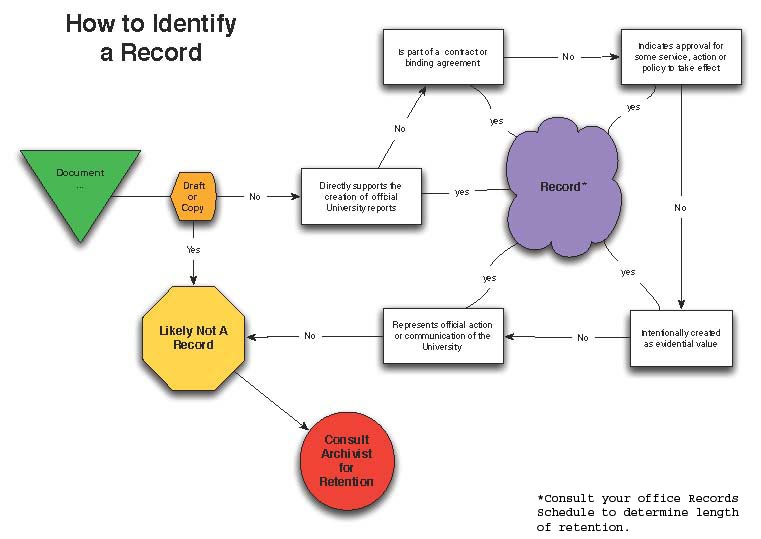Tate Archives & Special Collections
Records Retention
Every record, whether print or electronic, has a life cycle, and by understanding
the final disposition of your records, you can manage what should and should not remain
in your office more easily.
If it’s a record, you need a plan: will you keep it forever? Will you dispose of it at some point? When?
Offices can prevent the accumulation of unnecessary files (physical and electronic) when knowledgeable personnel take the time to identify the types of records they create and what will happen to them. This kind of advanced planning helps ensure the records we need will be available when we need them throughout staffing and organizational changes.
The University Archives preserves permanent records but the archivist is available for consultation on records inventories and the organization of files and schedules regardless of the final records' disposition decision you make for your office.

Terminology that helps in decision making:
Archival Value: The ongoing usefulness or significance of records, based on the administrative, legal, fiscal, evidential, or historical information they contain, justifying their continued preservation beyond their immediate business need. Records with archival value hold significance for understanding the history of a department, program, unit, notable individual, or the University as a whole.
Draft: A preliminary version of a document which may be subject to revision, and is not yet able to accomplish its intended purpose. A draft document has no legal authority, and therefore should not be considered a Record.
Duplicate copy: A copy of a Record that is not the authoritative copy. Typically a single office or unit holds the recognized authoritative copy of a Record, and as a result every other copy is purely a duplicate not susceptible to the strict controls that surround authoritative Records.
Evidence of an official action of the University: A record created by, received by, sanctioned by, or proceeding from an individual acting within their designated capacity as an official of the University. Official actions of the University can be located in official communications, decisions, policies, or rulings issued by the University.
Records Retention Schedule: A list of record types an office creates, how long they will keep the copy, the event or point in time that marks the start of the retention period, and the action that will take place at the end of that time (e.g., disposal, secure/confidential disposal, retain in office permanently, send to archives for permanent retention). Schedules may also designate offices with ultimate responsibility for the authoritative Record during the retention period. In 2008, IWU's cabinet approved this schedule for campus units to follow.
Reference material: Documents retained by an office or individual solely for use as a reference in order to accomplish their work.
Supporting documentation: Documents that provide context to help understand other records.
Transitory document: Records that are required only for a limited time to ensure the completion of a routine action or the preparation of a subsequent record are considered transitory. Examples of these records include correspondence that require no administrative action, policy decision, or special handling; and non-record notices, such as memoranda, that are not used as the basis of an administrative or program action or decision. Reference material may be considered transitory.
This information was adapted from a similar page created by the University Archives at the University of Illinois, Urbana-Champaign.